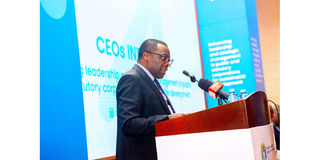Government introduces mandatory exams for top public sector roles

Chief secretary Moses Kusiluka speaks in Dar es Salaam on Monday on the first day of training for heads of state-owned enterprises. PHOTO | CORRESPONDENT
What you need to know:
- The new policy, announced by Chief Secretary Moses Kusiluka on Monday, aims to ensure that only competent individuals with a sound understanding of government systems are entrusted with leadership responsibilities.
Kibaha. The government has introduced mandatory examinations for newly appointed or promoted senior public officials as part of efforts to improve leadership efficiency and accountability in the public service.
The new policy, announced by Chief Secretary Moses Kusiluka on Monday, aims to ensure that only competent individuals with a sound understanding of government systems are entrusted with leadership responsibilities.
“This is how it is done globally. Development begins with a strong public sector, We are now in the process of introducing exams for officials after appointment or promotion to improve efficiency and ensure national targets are met,” Dr Kusiluka said.
He was speaking at the opening of a four-day training programme for chief executive officers and managing directors of public institutions, organised by the Office of the Treasury Registrar in collaboration with Uongozi Institute.
Dr Kusiluka said the exams would serve as a prerequisite for assuming office, underlining the government's drive to build a results-oriented, accountable and professional public sector and stressed the importance of aligning leadership with the implementation of national development goals.
He issued several directives to public sector leaders, including the need to strengthen revenue collection, cut unproductive spending and invest in human capital, digital systems and infrastructure. He also called for enhanced profitability among commercial institutions, improved service delivery in public entities and greater use of ICT to streamline operations.
Dr Kusiluka challenged the leaders to actively contribute to the implementation of Vision 2050—Tanzania’s long-term strategy to become an upper middle-income, industrialised nation with a projected GDP of $1 trillion and a per capita income of $7,000.
“In this financial year, I want to see public institutions avoid wasteful spending and redirect resources to national priorities such as infrastructure, health, education and social services. Chief executives have a responsibility to manage their institutions with efficiency and accountability.”
With global financial constraints and declining donor support, the government is urging public institutions to become more financially independent.
Permanent Secretary in the President’s Office (Public Service Management and Good Governance)Juma Mkomi warned some institutional heads against rejecting government-posted employees in favour of individuals of their own choosing.
“This is a recurring challenge. Some leaders refuse to accept newly assigned staff, while others are rejected by employees at their new postings,” he said. He reminded the participants that staff transfers are a legal and routine administrative practice.
Meanwhile, Treasury Registrar Nehemiah Mchechu urged commercial public entities to adopt business-oriented practices, operate competitively and contribute more effectively to the Government Consolidated Fund.




